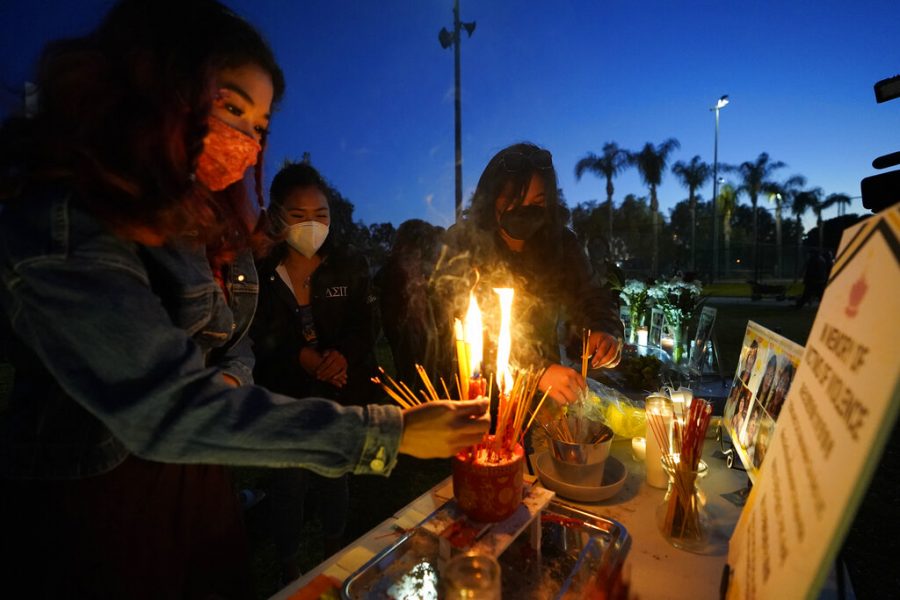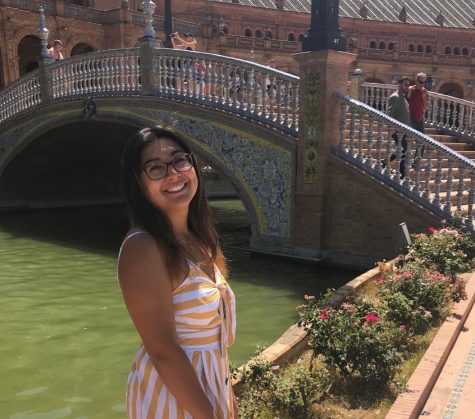The model minority myth has always been deadly
Women pay theirs respects at a memorial in honor of the victims of the shootings in Atlanta, where eight people were killed the week before, during a candle vigil in Monterrey Park, Calif., late Saturday, March 27, 2021.
Apr 1, 2021
The Atlanta shooting has sparked nationwide “Stop Asian Hate” protests and rallies after Robert Aaron Long killed eight people at three spas, six of whom were Asian women. This tragedy has brought anti-Asian racism into the national conversation, which often gets swept under the rug. However, Asian people have been subject to racism in America for centuries, dating back to the Chinese Exclusion Act and Japanese internment camps.
Among many factors, the model minority myth contributes to racism against members of the Asian American and Pacific Islander community. According to historian Ellen Wu, the model minority stereotype paints members of the AAPI community as rule-following, uncomplaining, hard-working individuals who exemplify the American Dream. Wu explained that this myth is deeply rooted in our nation’s history. When the first large wave of Asian Americans immigrated to the U.S. during the California Gold Rush, many Americans perceived them as dangerous foreigners who took American jobs.
Wu explained that the model minority myth may have started with Asian American leaders who wanted to promote positive images of their communities to counteract the prominent stereotype of “mysterious job stealers.” However, after World War II, politicians manipulated Asian American success as propaganda in mainstream media to gain foreign allies and secure power. “The model minority myth as we see it today was mainly an unintended outcome of earlier attempts by Asian Americans to be accepted and recognized as human beings,” explained Wu.
Today, the model minority stereotype is a major contributor to anti-AAPI racism. Since AAPI success stories are the dominant narrative, hate crimes against the AAPI community, more specifically Asian American women, go undercounted, according to The New York Times. Recent statistics from Stop AAPI Hate stated, “Out of nearly 3,800 incidents recorded in 2020 and 2021, more than two-thirds of the reports came from women.”
Yet, law enforcement and the general public just don’t seem to see the hatred that the AAPI community experiences, which has been made shockingly evident by the Atlanta shooting.
According to NBC News, Long stated that he had a “sexual addiction” and saw the three spas as a “temptation he needed to eliminate.” Law enforcement officials said that, based on what Long told investigators, the attacks did not appear to be motivated by race. Cherokee County Sheriff’s Capt. Jay Baker even said, “He had a bad day, and this is what he did.”
Last time I had a bad day, I didn’t kill eight people.
Baker’s unbelievably ignorant response ignores the intersectionality of racism and sexism against Asian American women. Celine Parreñas Shimizu, film scholar and author of the book “The Hypersexuality of Race,” explained how the fetishization of Asian women throughout history plays into the Atlanta shooting. Asian women are often objectified due to what men believe to be their “exotic” and “hypersexual” nature or taken advantage of as “docile” or “submissive.”
“With Asian women, there’s this construction of a being for others, and a being for the white man, usually, that were in these drawings and films and other cultural materials, that really extends to the way that we are capable of giving voice to this gunman,” said Shimizu. “Meanwhile, the Asian women who were killed were essentially silenced.”
Yet the model minority myth dismisses it all, causing some people to turn a blind eye to this racialized misogyny and make excuses for the murderer.
On the individual level, the model minority stereotype also trivializes the discrimination faced by members of the AAPI community personally. Author Viet Thanh Nguyen explains this experience in Time Magazine. “We told ourselves these were ‘minor feelings.’ How could we have anything valid to feel or say about race when we, as a model minority, were supposedly accepted by American society?” he said.
This model minority myth can make the AAPI community question the validity of their own experiences with racism and sexism. The idea that they are supposed to be uncomplaining rule-followers becomes even more harmful, discouraging members of the AAPI community from getting help, such as mental health care, or pursuing activism.
As a Filipino-American, I have fallen victim to the model minority myth myself and experienced this trivialization of racism. I have often brushed off comments from peers about eating dogs for holiday dinners or how tough my journey must have been coming over on the boat. With jokes about the “A- being the Asian F,” I have unconsciously learned to put immense amounts of pressure on myself to succeed academically. As I reflect on those instances, it’s almost like I have to convince myself, “Yes, that was racist.”
Even my own family perpetuates the model minority narrative. We only talk about our success story, in which my grandparents immigrated to the United States with nothing but a goal to make something of themselves. Their three children, my mom being one of them, then went on to become accomplished doctors and lived happily ever after. Of course, I’m proud of my family’s history, and I do not want to undermine their grit, resilience and sacrifice. But telling this story over and over again has created a dangerous precedent, in which discussing conflict, struggles or obstacles is often unwelcome at the dinner table.
This story also breeds another dangerous narrative. So many times I have heard older members of my family, “If we came here legally, why can’t they?” or “We came here and no one helped us, so why should we help them?” — “them” referring to non-Asian people of color. This perspective is not a unique one, as the perceived success of the AAPI community as the model minority is often used to downplay the role of systemic racism in the struggles of other minority groups, specifically African Americans. While Asian Americans have undoubtedly experienced racism, it is by no means the same racism that African Americans have experienced — the ultimate apples and oranges argument.
In an NPR article, Janelle Wong, the director of Asian American Studies at the University of Maryland, explained that this argument makes a “flawed comparison between Asian Americans and other groups, particularly Black Americans, to argue that racism, including more than two centuries of Black enslavement, can be overcome by hard work and strong family values.” In this case, the model minority myth deepens racial divides, breeding anti-Black sentiment in the AAPI community and resentment toward the AAPI community from non-Asian people of color. Ultimately, it gets White America off the hook yet again.
The model minority myth has created conditions in which society has allowed tragedies like the Atlanta shooting to occur. It is damaging, divisive and deadly. We, as members of the AAPI community, are hurting because of it. As a society, we must disrupt the model minority narrative and other harmful stereotypes in order to understand anti-Asian racism and live in solidarity with the AAPI community.
For ways that you can take action, vist the Stop AAPI Hate website.













